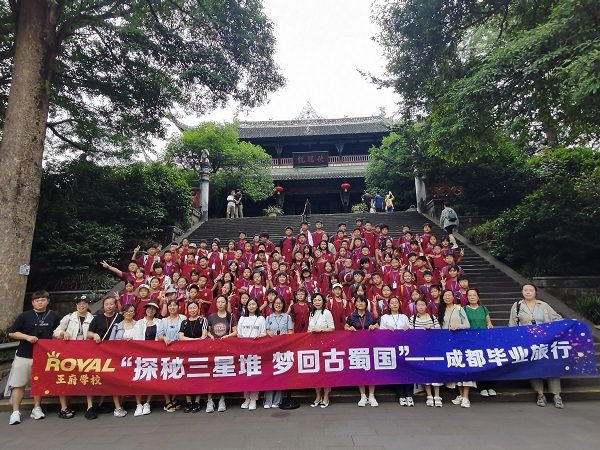search for a Trip
Chinese Valentine’s Day: "Qi Xi" Festival
Source: Xinhuanet
Today is Qixi Festival, known as Chinese Valentine's Day, which is also called "Qiqiao Festival(Begging for Skills Festival)" or "Daughters' Festival."
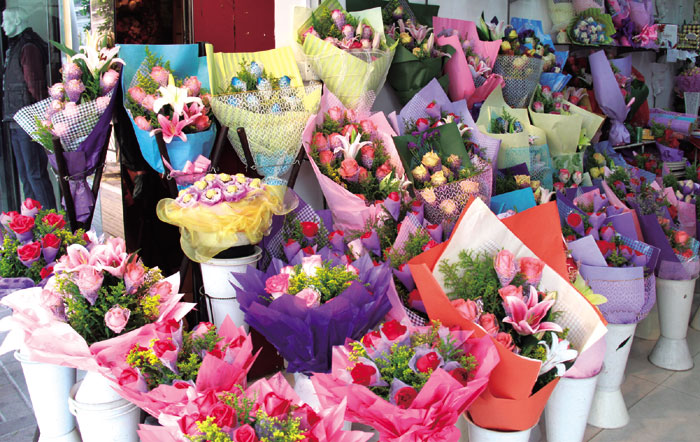
Photo shows beautiful roses displayed at a shopping mall
Valentine's Day is for everyone, whether you have your sweet heart or not. Those who don't may feel the festive atmosphere as well. Anyway, nobody wants to miss this sweet day.
As a country of long history and rich culture, China has her special day for people in love. The day is called the Magpie Festival, Double Seventh Festival or simply "Qi Xi". It happens to fall on August 9, this year.
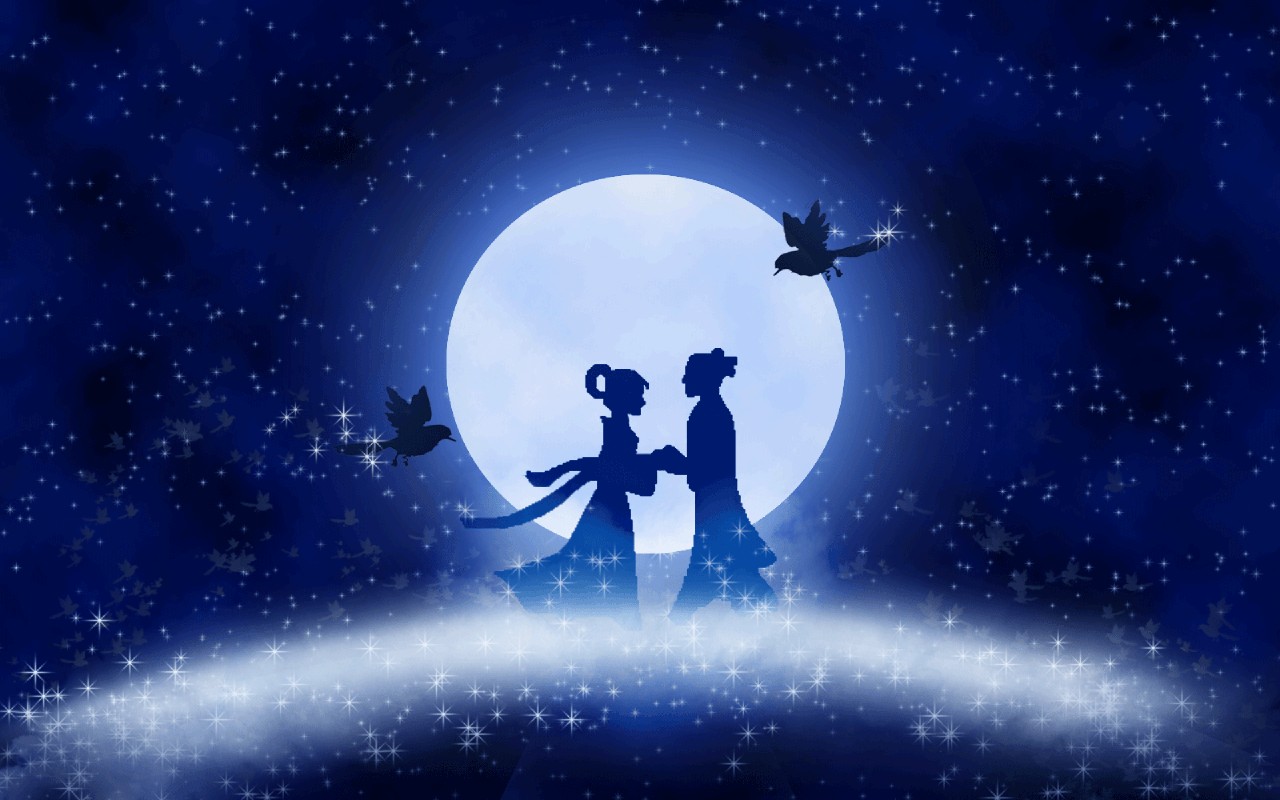
This is a day with the multifarious myths behind it. In 2006, it was included in the China Intangible Cultural Heritage List along with the Spring Festival, Dragon Boat Festival by the State Council.
The love story:
Originated in the Han Dynasty (202 BC-220 AD), the story said a "Seventh Daughter" of the Mother Queen in the Heaven is in a vision of heavenly beauty and dexterous. Against the rule of the Heaven, the fairy daughter fell in love with and secretly married a young human on the Earth, an orphaned cowherd. This infuriated the Mother Queen.
The Mother Queen forced the poor "Seventh Daughter" to ascend up back to the Heaven and seized her while her husband and their two children chased after her. When they were about to catch up with her, the heartless Mother Queen took off one of her gold hairpins and made a stroke.
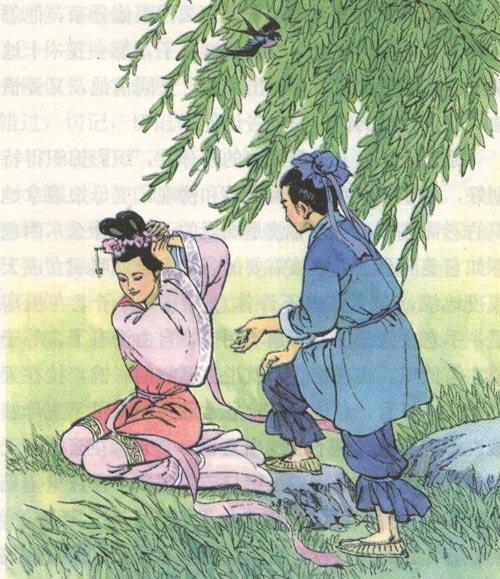
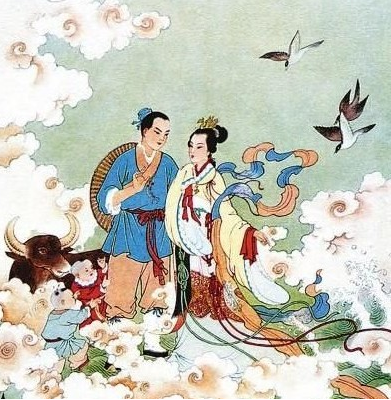
Suddenly, a billowy river, the Milky Way, ran between the husband and his wife and separated them with the river up in the sky. From then on, they could see each other from both sides of the river, but could never be together. After uncountable years, the deadly sadness of the couple and distressing cry and call for mommy of their twins somewhat touched the Mother Queen.
She allowed the "Seventh Daughter" and her husband to be together only once every year -- on the seventh day of the seventh lunar month -- "Qi Xi" (Double Seventh).
The couple's loyalty to love not only touched the Mother Queen, but even touched the magpies, a kind of birds symbolizing happiness in Chinese culture.
Thus, the story said, on "Qi Xi" , tens of thousands of magpies would fly to the sky to build a bridge for the couple and their twins to walk cross and meet each other. "No wonder magpies are seen scarcely on that day as they are building the bridge up in the sky," many Chinese really believe.
As time goes by, people make this day as the sweet day for people to glorify their loyal and steadfast love.
Celebration:
Unlike St. Valentine's Day in Western countries there is not so much emphasis on giving chocolates, flowers and kisses. Instead, Chinese girls prepare fruits, melons and incense(熏香) as offerings to Zhi Nu, the weaving maiden, praying to acquire high skills in needlecraft(裁缝), as well as hoping to find satisfactory husbands. In the evening, people sit outdoors to observe the stars. Chinese grannies would say that, if you stand under a grapevine, you can probably overhear what Zhi Nu and Niu Lang are talking about.
However,today in China, besides various customs and celebrations on this day, one special activity is that many loving couples would take their daughters to the place where they themselves first fell in love with each other. They like to pay someone on the spot to paint portraits for their daughters.
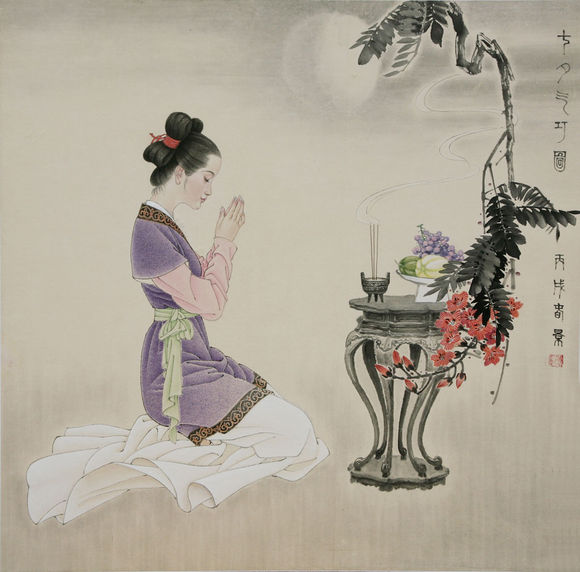
"Qi Xi" is in fact more than a festival. It has become a bridge for cultural communication. Now the tradition of celebration has spread to other places in East Asia.
The Japanese call it the Tanabata festival. Joyous fireworks party is typical on this day across the country. In South Korea and Vietnam, different kinds of special flour-made food – sweet and sticking -- are popular for the celebration.
Today is Qixi Festival, known as Chinese Valentine's Day, which is also called "Qiqiao Festival(Begging for Skills Festival)" or "Daughters' Festival."

Photo shows beautiful roses displayed at a shopping mall
Valentine's Day is for everyone, whether you have your sweet heart or not. Those who don't may feel the festive atmosphere as well. Anyway, nobody wants to miss this sweet day.
As a country of long history and rich culture, China has her special day for people in love. The day is called the Magpie Festival, Double Seventh Festival or simply "Qi Xi". It happens to fall on August 9, this year.

This is a day with the multifarious myths behind it. In 2006, it was included in the China Intangible Cultural Heritage List along with the Spring Festival, Dragon Boat Festival by the State Council.
The love story:
Originated in the Han Dynasty (202 BC-220 AD), the story said a "Seventh Daughter" of the Mother Queen in the Heaven is in a vision of heavenly beauty and dexterous. Against the rule of the Heaven, the fairy daughter fell in love with and secretly married a young human on the Earth, an orphaned cowherd. This infuriated the Mother Queen.
The Mother Queen forced the poor "Seventh Daughter" to ascend up back to the Heaven and seized her while her husband and their two children chased after her. When they were about to catch up with her, the heartless Mother Queen took off one of her gold hairpins and made a stroke.


Suddenly, a billowy river, the Milky Way, ran between the husband and his wife and separated them with the river up in the sky. From then on, they could see each other from both sides of the river, but could never be together. After uncountable years, the deadly sadness of the couple and distressing cry and call for mommy of their twins somewhat touched the Mother Queen.
She allowed the "Seventh Daughter" and her husband to be together only once every year -- on the seventh day of the seventh lunar month -- "Qi Xi" (Double Seventh).
The couple's loyalty to love not only touched the Mother Queen, but even touched the magpies, a kind of birds symbolizing happiness in Chinese culture.
Thus, the story said, on "Qi Xi" , tens of thousands of magpies would fly to the sky to build a bridge for the couple and their twins to walk cross and meet each other. "No wonder magpies are seen scarcely on that day as they are building the bridge up in the sky," many Chinese really believe.
As time goes by, people make this day as the sweet day for people to glorify their loyal and steadfast love.
Celebration:
Unlike St. Valentine's Day in Western countries there is not so much emphasis on giving chocolates, flowers and kisses. Instead, Chinese girls prepare fruits, melons and incense(熏香) as offerings to Zhi Nu, the weaving maiden, praying to acquire high skills in needlecraft(裁缝), as well as hoping to find satisfactory husbands. In the evening, people sit outdoors to observe the stars. Chinese grannies would say that, if you stand under a grapevine, you can probably overhear what Zhi Nu and Niu Lang are talking about.
However,today in China, besides various customs and celebrations on this day, one special activity is that many loving couples would take their daughters to the place where they themselves first fell in love with each other. They like to pay someone on the spot to paint portraits for their daughters.

"Qi Xi" is in fact more than a festival. It has become a bridge for cultural communication. Now the tradition of celebration has spread to other places in East Asia.
The Japanese call it the Tanabata festival. Joyous fireworks party is typical on this day across the country. In South Korea and Vietnam, different kinds of special flour-made food – sweet and sticking -- are popular for the celebration.
More Attractions


